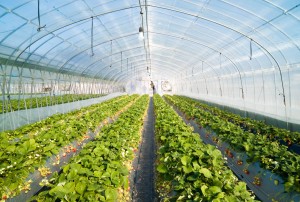While the world’s population is expanding, family farms are shrinking. Growers are pressured to produce more food on less land. But our farmers are staying true to their environmental roots by using green technology and innovations like these:
 Plasticulture
Plasticulture- Recycled packaging
- Drip irrigation
- Pest control methods that are friendlier to land, air and water supply than harsh chemicals
- Solar power
- Organic growing methods
Each of these techniques plays a part in sustainable agriculture. That term has evolved over the years, but it is most simply defined as growing food using farming techniques that protect the planet and the people who live on it. Sustainable agriculture produces healthy food without depleting natural resources, including land, air and water. That’s more than a lofty principle. It’s a way of life on our farms. Some of the ways our farms practice sustainable agriculture include:
Chappell Farms
All of our growers, including the Chappells, operate a GAP-certified farm, which means the U.S. Department of Agriculture has recognized their efforts for using Good Agricultural Practices that are eco-friendly. The Chappells also use an integrated pest management system. That means harsh chemicals are not the go-to method for controlling pests that can decimate a crop and cause harm to people and the planet. Integrated pest management combines a variety of environmentally friendly techniques to accomplish long-term pest control. The techniques range from planting varieties that resist pest damage to manipulating the growing environment to make it unattractive to pests. At Chappell Farms, every peach orchard also is drip irrigated, a green farming practice that uses up to 80 percent less water than traditional overhead sprinklers.
Cotton Hope Farms
Jimmy Durbin Farms
You probably don’t think of plastic when you think of agriculture, but plasticulture is used regularly on Jimmy Durbin Farms. It incorporates uses for plastic, such as plastic mulch, into the growing process. Plastic mulch can help produce twice the crops with half the water — sometimes twice the yield, or even more, on less land.
Drip irrigation beneath the plastic allows workers to control how much water and fertilizer gets to each plant, delivering a triple reward of saving water, controlling erosion, and sending precise amounts of nutrients to plants’ roots. Earlier production is another major plus. Plastic mulch raises soil temperature, so plants grow faster and mature sooner. Spring vegetables grown on black plastic often can be picked up to 21 days earlier than with other mulches. Plasticulture also reduces competition from invasive weeds and insects, and prevents waterlogged soil and rot.
Stanley Farms
This farm is remarkably energy efficient and environmentally sound. It harnesses solar energy to power irrigation systems, and reduces carbon emissions by converting major machinery from fossil fuels to natural gas and electric power. Stanley Farms’ management team is a powerhouse of experts who once worked for global agribusiness leaders like BASF, Bayer and Bunge — brainpower and expertise that constantly researches next-generation techniques to improve planting, harvesting and packing operations. Behind the scenes, farmers, employees and environmental experts work to create a company that leads innovation and industry change, not only in food safety, but also in sustainability. Stanley Farms’ mission is to leave the land much better than they found it so that generations of future farmers can carry forth the tradition.

George S. Orr and Sons
In business since 1954, Orr and Sons oversees 1,100 acres of orchards and produces 500,000 bushels of fruit a year, including peaches, apples, plums and nectarines. Their eco-friendly approach to farming includes what industry experts call an integrated pest management system. It gets rid of pests, insects, plants and weeds that are harmful to crops by using natural enemies, trapping bugs, and regularly mulching and rotating crops.
McLeod Farms
McLeod Farms uses a variety of high-tech equipment, including drip irrigation to conserve water and wind machines to prevent frost damage. Windmills with 30-foot propellers powered by Chevrolet engines have been converted to propane. Windmills circulate warm air created when hay bales are burned on the periphery of the peach orchards. Using them helps minimize crop losses in cold weather. The magic numbers for freeze at the orchards are 17 degrees for a short period and 24 degrees for 12 hours or more. Warm air circulated by the windmills prevents cold air and frost from settling on the blooms. After escaping late spring freezes, a major concern is hail. To keep it at bay, the McLeods have installed a hail gun. It saturates the air above the orchards with high-decibel sound waves that break up hailstorms. During high-risk times, they closely monitor Doppler radar via a computer link. When conditions are right, they zap the air with ear-splitting sounds.
